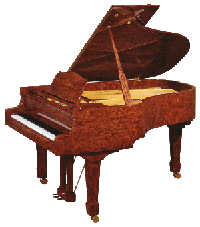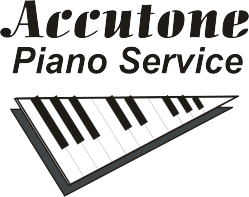This is a decision you’re going to want to put some thought into. You’ll probably have the piano for a long time, so choose carefully. Even if it’s not played, it will be hard to give up!
- Appearance: You’ll want to get some idea what kind of piano you want. There are so many styles and colors, cabinet designs, etc,. to choose from. You will want to match the decor if possible, in color and style.
- Size: If you choose an upright piano, it really doesn’t matter how tall it is. It’s going to take up the same amount of space. A grand piano is going to require more real estate, so be sure it will fit where you want to put it. Many dealers have a pattern you can borrow and lay on the floor. It will give you an idea how it’s going to fit in the space. Be sure to allow for the bench and maybe a floor lamp.
- Upright or Grand? If you have room for a grand, overall it’s going to be a better choice for a serious pianist. Aside from the glitzy appearance, there are some advantages you might not be aware of. The action of the grand piano allows the pianist to play more reliably and faster than with an upright piano. This is because the grand piano action relies upon gravity to reset, whereas the upright piano uses springs to return the hammer to the rest position. The action in a grand piano is removable in its entirety by simply sliding it out. It’s easy to clean and service. The upright piano, and the spinet in particular, are harder to service.
- Cost Vs Value: Generally, the more you pay, the better when it comes to pianos. The materials, craftsmanship, engineering and design all play a factor in building a piano. If any of these is substandard, the piano will not sound or play as good as one that has all of them. There are many entry level pianos available, and these can be fine instruments, but there are shortcuts and lesser materials used in them, so be aware. Make sure you like how the piano sounds and how it plays. If you don’t love it, don’t buy it. A name brand piano is going to bring more in the resale than an unknown brand, but there are many good pianos with names you might not know. Don’t buy just for the name.
- Imports Vs. Domestic: Nowadays, everything is coming from China. Pianos are no exception. There are a few good Chinese piano manufacturers, which benefit from the expertise of foreign techical advice by American or European companies. It has taken many years, but the level of skill in these factories is now equal to the old American manufacturers. Most of these pianos are entry level, though I’ve seen some that are really stellar. You can purchase a nice grand piano for a very reasonable price. But you should know that the longevity of the Chinese pianos is not yet proven.
- Used or New: The market is flooded nowadays with used pianos. Craigslist and local ad papers are full of many bargains in the depressed economy. If you check often, you will probably find something that is worth a look. Try to stick to the famous brands, like Yamaha, Kawai, Chickering, Knabe, Baldwin, Steinway, Bosendorfer and others. A new piano, of course, will give you a warranty, and you can usually get financing. Some stores will also finance a used piano. If you’re willing to do some footwork, now is the time to score that piano you always dreamed of. Don’t be afraid to drive a hard bargain. No prices are set in stone, and dealers are often willing to deeply discount a piano just to make a sale. You might try to start a bidding war with two or three stores for their best offer. No matter which piano you buy, be sure to have it checked by a technician to make sure you aren’t buying somebody else’s headache. A substantial problem might sour your purchase after you discover how much it might cost to fix.
If you have any questions about the piano you are thinking of purchasing, give me a call or an email. I”ll be very glad to discuss your purchase and give you hints where you might be able to find one. Happy Hunting!



